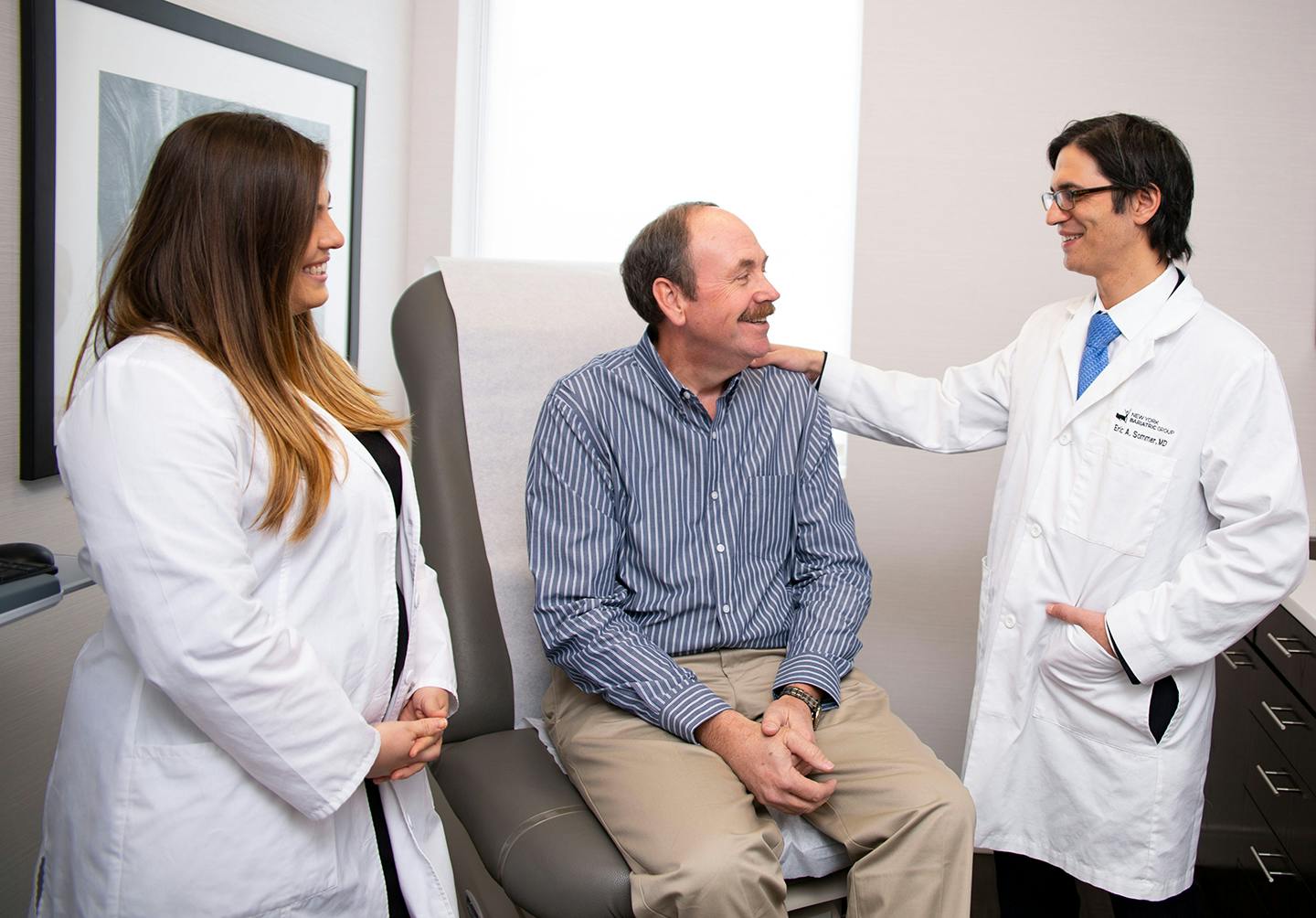If you met with one of our dietitians, Sharon George or Rachel Daniels, prior to surgery, you were given a full package of materials regarding the postop diet. Please follow these instructions to the best of your ability.

It is strongly suggested that all post-op patients make monthly appointments with Sharon or Rachel after surgery. These appointments allow you to review any food problems you may be having, make sure you are getting enough protein, get answers to any diet-related questions, advance your diet properly, and plan your daily food regimen. The postoperative diet is divided into 3 stages with specific timelines and guidelines for each to allow gradual adjustment to your new stomach after surgery:

Stage I: Bariatric Liquid Diet
Patients will be on the stage I diet in the hospital and some will remain on the diet after surgery, as per their surgeon. This stage includes low-sugar, non-carbonated liquids.
- You will be brought a tray with water, tea, broth, and/or sugar-free Gatorade.
- Low-sugar, non-carbonated drinks include Crystal Light, Diet Snapple, & Vitamin Water Zero.
- Sugar-free Jell-O and popsicles are also allowed.
- Drink 3 NYBG protein drinks a day (about 15-20 grams of protein each) to reach the goal of 60 grams of protein.
- Use a cup to drink. Avoid sipping from the bottle or using straws – this can make you swallow too much air and cause gas.

Stage II: Bariatric Soft, Mushy Pureed Diet. First Month After Surgery.
Stage II of your post-bariatric surgery diet, soft foods from the list below can now gradually be added. Be sure to continue following all of our additional instructions and guidelines for your bariatric surgery diet to ensure a smooth and comfortable experience and recovery process.
3 meals per day with 2 NYBG protein shakes or supplements containing 15-20 grams of protein each between meals.
Stage II Foods
- Skim or 1% milk, low fat cottage cheese, low-fat plain yogurt, low-fat ricotta cheese
- Chicken, vegetable, or beef broth (without noodles, vegetables, or chunks)
- Ground meat and poultry like turkey, chicken, veal, or pork
- Eggs or egg whites, in all forms, as long as they are not dried out, and can be mashed with a fork
- White flakey fish, like tilapia, cod, or flounder
- Pureed chicken and vegetable soup, especially if experiencing constipation
- Sugar-free popsicles, jello, puddings or fudgesicles
Be Sure to Avoid
- Carbonated drinks – these will stretch your stomach and give you gas pains!
- Creamy soups – these are high in fat and calories!
- Reheating foods in the microwave – the microwave will alter the consistency of food
Important Points
- Chew well, eat food slowly.
- Make sure protein is moist and in small pieces.
- No eating and drinking at the same time. Drink your fluids between meals and up until the meal. Wait 30 minutes after the meal to resume drinking.
Vitamins and Minerals
- Multivitamin: Take 1 chewable vitamin (e.g. NYBG.) daily. These are best taken with food.
- Calcium: Take our recommended Calcium Citrate Lozenges four times a day, 1 with breakfast, lunch, snack and dinner.

Note: A BMI of 30 – 34.9 or BMI 35 – 39.9 with no comorbidities qualify for lap band but is usually not covered by insurance.
Stage III: Bariatric Regular Diet. Start When Stage II Has Been Tolerated for 1 Month.
If you tolerated the Stage II diet well, you will gradually advance to the Stage III solid diet. This will be discussed at your one-month post-op visit. Stage III emphasizes moist protein foods. Introduce one solid food item a day and pay close attention to how your body tolerates these new foods. Discuss removing the protein shakes at your one month follow-up visit.
3 meals and one 75 calorie snack per day to reach your protein goal of 60-75 grams

Stage III Proteins, ranging from most dense to least dense
- Pork, beef, lamb, lean beef
- Chicken, preferably dark meat, without skin, rotisserie chicken
- Salmon, swordfish, tuna steaks, shrimp, lobster, mussels, clams
- Soft flaky fish, canned tuna, Tofu, eggs, low-sodium deli meats like turkey
- Ground lean meats, like turkey, chicken, veal, or pork
- Cottage cheese, soft cheese, hard cheese (low fat)
- Low-fat yogurt or protein shakes
Important Points
- Everyone is different. Take your time learning which foods are OK for you!
- Slow down your eating! Pace yourself! Chew thoroughly! Avoid overeating!
- If a certain food is not tolerated, it is OK to try it again a week later.
- Protein is important – try and meet your daily goal!
- Fat and sugar/carbohydrates should be avoided.
- Wait 30 minutes after eating before drinking.
- If you are having issues with constipation please speak to your PA or surgeon.
- Dense proteins will keep you full for longer, so focus on getting a variety of proteins.
Vitamins and Minerals
- Multivitamin: You may continue with your chewables or switch to a pill. Take 1 pill 2 times per day. Vitamins should be taken with food. Avoid time-release capsules.
- Calcium: Calcium citrate is the best-absorbed type of calcium. Some have extra vitamin D, which is good.
Hydration and Fluids
It is crucial to remain hydrated after surgery. No sugary beverages are allowed, including juices, soda, and sweet tea. Limit caffeine to 12-16 oz. per day.
Drink 8-10 glasses (64-80 oz.) of non-caffeinated, non-carbonated, sugar-free fluids per day.
Acceptable Fluids
- Water
- Crystal light, Mio
- Hint water, flavored waters
- Diet Snapple
- Decaf coffee/tea
- Vitamin water zero, Propel
- Non-fat or 1% milk
- Unsweetened almond or soy milk

General Diet Hints and Problem Solving
Remember, weight loss surgery is a very powerful tool to help you lose weight. But it is not a “silver bullet.” You can only expect good weight loss results after surgery if you follow the recommended postoperative diet and exercise 3 times per week or more!
- It is important to follow the three stage diet plan to allow gradual adjustment.
- No eating and drinking at the same time. Drink your fluids between meals and up until the meal. Wait 30 minutes after the meal to resume drinking.
- Allow 30 minutes for meals and once 30 minutes have passed the meal is over.
- Don’t eat on the run, make a set space and time for meals to avoid mindless eating.
- Chew your food well.
- Get to know your new stomach. It will fill up more quickly than your old stomach. The feeling of fullness will be different. When you start to feel full, stop!!!
- Sometimes when you are hungry you may truly be thirsty, so take a drink to see if that satisfies the feeling first.










